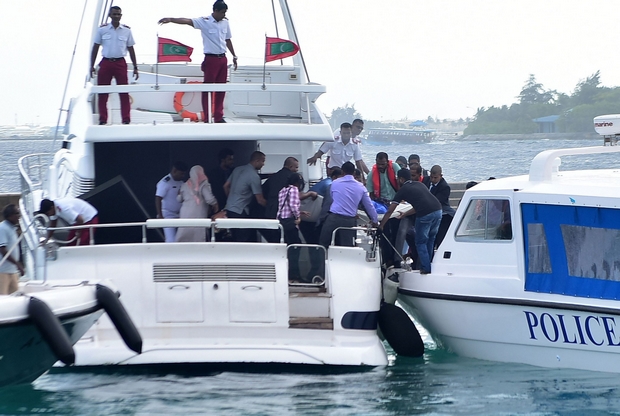Malé, Maldives – Supreme Court of the Maldives has ruled that jailing of Maldives National Defence Force (MNDF) personnel Ahmed Thihaam for alleged evidence tampering at the site of the presidential launch “Finifenmaa” bombing, was done illegally.
In September of 2015, then President Abdulla Yameen Abdul Gayoom was travelling in the presidential launch “Finifenmaa”, when an explosion was set off, shortly after which Ahmed Thihaam, disregarding procedures, proceeded to board the launch and removed evidence from the scene.
Thihaam, along with another man- Moosa Zameer were jailed for 4 months and 24 days for evidence tampering. Malé Area Commander of the time Ahmed Fayaaz (Papa), was also sentenced to 2 years in prison by the Criminal Court for his involvement.
While Zameer’s and Fayaaz’s sentences were anulled by the Criminal Court in 2019, Thihaam’s sentence was upheld. All three men had served their sentences and were free at the time of this declaration.
Thihaam later appealed this decision at the Supreme Court, who have stated today that the state could not clarify the action taken by Thihaam to destroy, hide or tamper evidence. They added that while searching a scene without gloves can be considered as evidence tampering, the state could not prove Thihaam’s intent.
Supreme Court’s ruling also indicated that MNDF was negligent in handling the incident. There were no standard operating procedures for such an incident at the time, which allowed Thihaam, representing the Explosive Ordnance Disposal (EOD) team to board the launch and conduct a search without gloves, which was standard for EOD team members according to witnesses.
Justice Dr. Azmiralda Zahir said that she does not believe the incident was caused by just one or two individuals, and that looking at various testimonies that it was apparent that this was due to steps not being taken at an organizational level by MNDF.
A main point Thihaam has reiterated at the Supreme Court, as well as lower courts, is that he moved evidence from the launch as he was ordered to do so by his then commander Fayaaz, and that he should not be found guilty as he is protected under chain of command laws.
However, the supreme court said that MNDF commanders can only issue order which are in line with the Constitution of the Republic of Maldives, and that soldiers are only obliged to follow commands which are allowed within the constitution, and that protection by chain of command cannot be seen as a valid defence.
They added that if chain of command protection is seen as valid, there would be no way to prosecute soldiers for any crimes they commit. They also noted that even under international law, both soldiers and their superiors are held accountable for crimes committed during war time.
The court also expressed their concerns as the Prosecutor General changed their stance on the case. The state explained their change in stance as the other two involved in the case were cleared of their charges.
However, the Supreme Court noted that Thihaam was convicted of different charges than the other two, adding that changing their stance after pressing charges against an individual and convicting them of the said charges appears to be due to a lack of investigation of the case.





